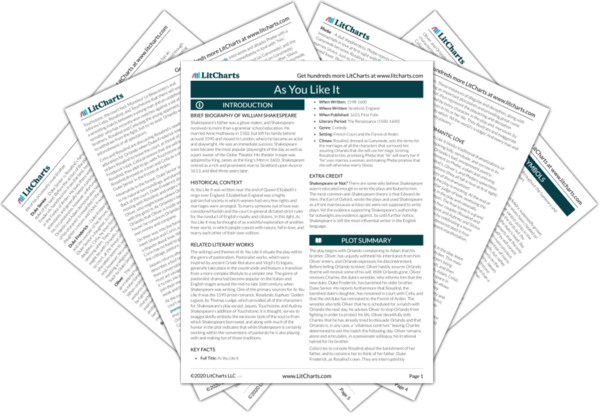
Welcome to the LitCharts study guide on William Shakespeare's As You Like It. Created by the original team behind SparkNotes, LitCharts are the world's best literature guides.
Shakespeare's father was a glove-maker, and Shakespeare received no more than a grammar school education. He married Anne Hathaway in 1582, but left his family behind around 1590 and moved to London, where he became an actor and playwright. He was an immediate success: Shakespeare soon became the most popular playwright of the day as well as a part-owner of the Globe Theater. His theater troupe was adopted by King James as the King's Men in 1603. Shakespeare retired as a rich and prominent man to Stratford-upon-Avon in 1613, and died three years later.
Get the entire As You Like It LitChart as a printable PDF."My students can't get enough of your charts and their results have gone through the roof." -Graham S.

As You Like It was written near the end of Queen Elizabeth’s reign over England. Elizabethan England was a highly patriarchal society in which women had very few rights and marriages were arranged. To marry someone out of love was considered foolish and the court in general dictated strict rules for the conduct of English royalty and citizens. In this light, As You Like It may be thought of as a wishful exploration of another, freer world, in which people coexist with nature, fall in love, and marry each other of their own volition.
The settings and themes of As You Like it situate the play within the genre of pastoralism. Pastoralist works, which were inspired by ancient Greek literature and Virgil’s Eclogues, generally take place in the countryside and feature a transition from a more complex lifestyle to a simpler one. The genre of pastoralist drama had become popular on the Italian and English stages around the mid-to-late 16th century, when Shakespeare was writing. One of the primary sources for As You Like It was the 1590 prose romance, Rosalynde, Euphues’ Golden Legacie , by Thomas Lodge, which provided all of the characters for Shakespeare’s play except Jaques, Touchstone, and Audrey. Shakespeare’s addition of Touchstone, it is thought, serves to exaggeratedly embody the excessive style of the source from which Shakespeare borrowed, and along with much of the humor in the plot indicates that while Shakespeare is certainly working within the conventions of pastorals he is also playing with and making fun of those traditions.
Key Facts about As You Like ItShakespeare or Not? There are some who believe Shakespeare wasn't educated enough to write the plays attributed to him. The most common anti-Shakespeare theory is that Edward de Vere, the Earl of Oxford, wrote the plays and used Shakespeare as a front man because aristocrats were not supposed to write plays. Yet the evidence supporting Shakespeare's authorship far outweighs any evidence against. So until further notice, Shakespeare is still the most influential writer in the English language.